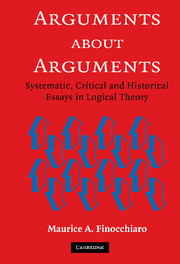Book contents
- Frontmatter
- Contents
- Preface and Acknowledgments
- Introduction : An Approach to a Branch of Logic
- Theorizing about reasoning and argument
- Fallacies and asymmetries
- 6 Fallacies and the Evaluation of Reasoning (1981)
- 7 Six Types of Fallaciousness : Toward a Realistic Theory of Logical Criticism (1987)
- 8 Asymmetries in Argumentation and Evaluation (1992)
- 9 The Positive versus the Negative Evaluation of Arguments (1994)
- Critiques
- Historical analyses
- Selected Bibliography
- Index
6 - Fallacies and the Evaluation of Reasoning (1981)
from Fallacies and asymmetries
Published online by Cambridge University Press: 05 February 2015
- Frontmatter
- Contents
- Preface and Acknowledgments
- Introduction : An Approach to a Branch of Logic
- Theorizing about reasoning and argument
- Fallacies and asymmetries
- 6 Fallacies and the Evaluation of Reasoning (1981)
- 7 Six Types of Fallaciousness : Toward a Realistic Theory of Logical Criticism (1987)
- 8 Asymmetries in Argumentation and Evaluation (1992)
- 9 The Positive versus the Negative Evaluation of Arguments (1994)
- Critiques
- Historical analyses
- Selected Bibliography
- Index
Summary
The Fallacy Approach
The evaluation of reasoning is perhaps the central practice in philosophical scholarship, yet theoretical discussions of it are very rare. To be sure, the theory of validity in formal logic is in a sense a theoretical analysis of the evaluation of reasoning, insofar as formal validity is supposedly the fundamental concept expressing a positive, favorable evaluation of an argument, while an argument is supposedly the fundamental unit of reasoning. In the present context, however, the relevance of formal validity does not seem to go very far; moreover, insofar as it is relevant, it faces the difficulty stemming from the well-known fact that formal validity is neither a sufficient nor a necessary condition for the favorable evaluation of an argument. It is not sufficient because it excludes neither question-begging arguments nor self-contradictory ones (i.e., argument with inconsistent premises). It is not necessary partly because of the Toulmin-type objection that most good arguments most of the time (in the empirical sciences, legal contexts, humanities, and everyday life) are not formally valid, and partly because formal validity presupposes fully reconstructed arguments, which in human reasoning are the exception rather than the rule.
The theory of fallacies may be interpreted as a more relevant contribution to the evaluation of reasoning. This applies to the somewhat informal accounts of fallacies found in many logic textbooks, rather than to theories of fallacies.
Information
- Type
- Chapter
- Information
- Arguments about ArgumentsSystematic, Critical, and Historical Essays In Logical Theory, pp. 109 - 127Publisher: Cambridge University PressPrint publication year: 2005
Accessibility standard: Unknown
Why this information is here
This section outlines the accessibility features of this content - including support for screen readers, full keyboard navigation and high-contrast display options. This may not be relevant for you.Accessibility Information
- 1
- Cited by
